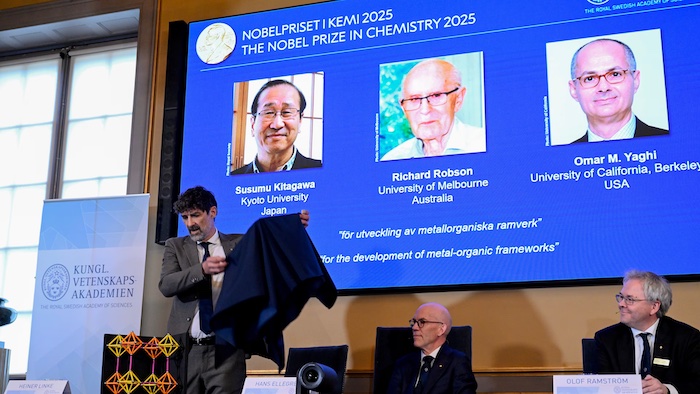
The Nobel Prize in Chemistry has been awarded to Susumu Kitagawa, Richard Robson, and Omar M. Yaghi for their groundbreaking work on metal organic frameworks (MOFs) a new class of materials with vast potential to solve major global challenges such as carbon capture and plastic pollution.
The Royal Swedish Academy of Sciences made the announcement on Wednesday at a news conference in Stockholm, Sweden, recognising the trio’s pioneering research that opened new frontiers in what it called “molecular architecture.”
Speaking after learning of his win, Professor Kitagawa of Kyoto University, Japan, said: “I’m deeply honoured and delighted, thank you very much.” Moments later, he added with laughter: “How long do I have to stay here? Because I have to go out for a meeting.”
Each of the three laureates Kitagawa, Professor Richard Robson of the University of Melbourne, Australia, and Professor Omar M. Yaghi of the University of California, United States will share the 11 million Swedish kronor (£872,000) prize money.
Their discovery involves assembling molecules into porous frameworks, creating structures with exceptionally large internal spaces. These cavities can trap gases like carbon dioxide, filter pollutants, or even separate chemicals, making MOFs a promising tool in environmental protection and clean energy applications.
The Nobel committee described their achievement as “a triumph in molecular design that enables humanity to manipulate matter at the atomic level for a sustainable future.”
This year’s Chemistry Nobel follows the Physics Prize awarded on Tuesday to John Clarke, Michel H. Devoret, and John M. Martinis for their work in quantum mechanics, and Monday’s Medicine Prize recognising three scientists who discovered how the immune system combats infections.
The 2025 Nobel Prize announcements will continue throughout the week, culminating with the Peace Prize on Friday and the Economics Prize on Monday.
Erizia Rubyjeana


